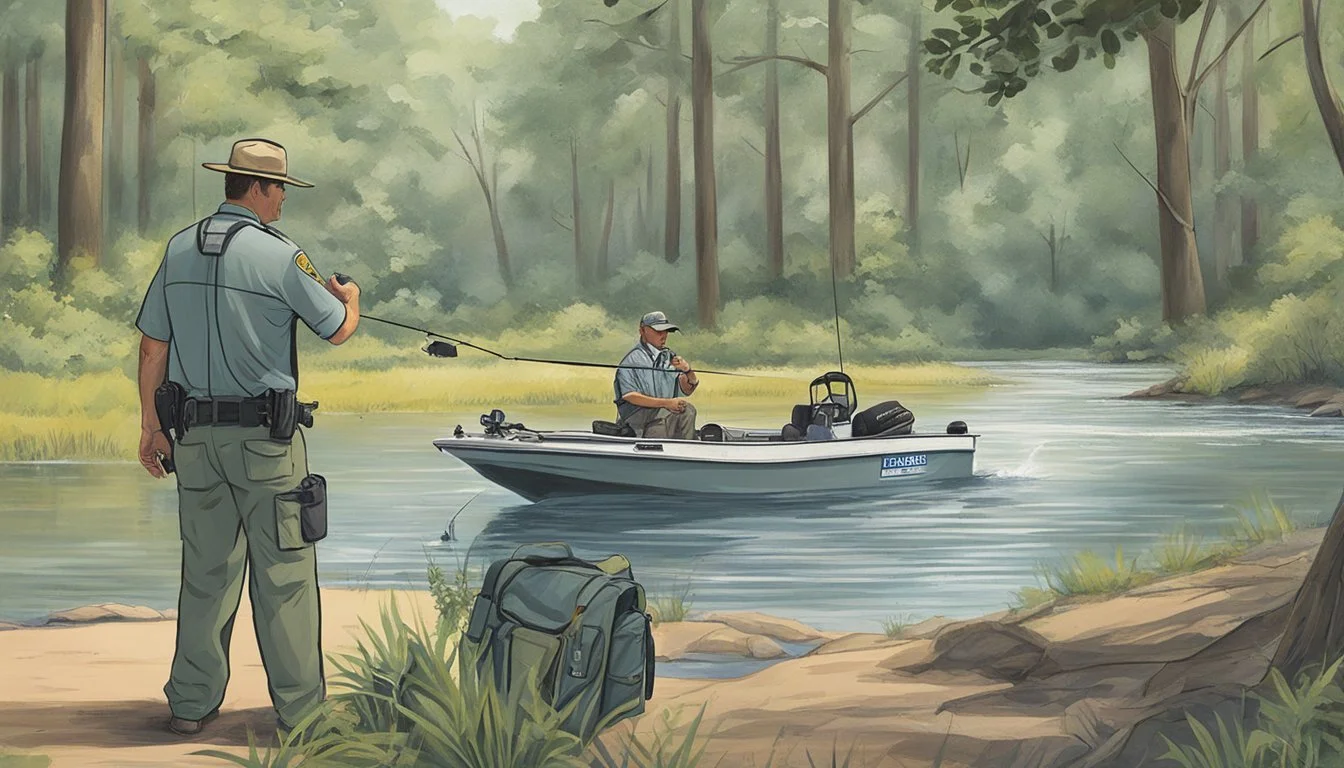How to Get a South Carolina Freshwater Fishing License
Your Essential Guide
Obtaining a freshwater fishing license in South Carolina is a straightforward process essential for anyone looking to fish legally within the state's freshwater bodies. The South Carolina Department of Natural Resources (SCDNR) is the governing body responsible for issuing fishing licenses. Licenses are mandatory for anglers as they contribute to conservation efforts and ensure sustainable fishing practices. For residents of South Carolina, eligibility for a freshwater fishing license requires proof of residency within the state for at least 30 consecutive days.
South Carolina offers a range of licenses including annual, short-term, and lifetime options to suit different levels of fishing commitment. The state also provides licenses tailored to various groups such as seniors, youth, and people with disabilities. Applications for a fishing license can be completed through the SCDNR website, by visiting one of the 500 license agents statewide, or by going directly to an SCDNR office. It is important for applicants to have their identification and any necessary documentation ready when applying to ensure the process goes smoothly.
Eligibility for Freshwater Fishing Licenses
When pursuing a freshwater fishing license in South Carolina, an individual's residency status, age, and certain specific circumstances dictate their eligibility. These criteria ensure that licenses are issued in accordance with state regulations.
Residency Requirements
A resident is someone who has continuously lived in South Carolina for at least 365 days prior to applying for a license. They must present proof of residency, typically a state-issued Driver's License or Identification Card. For a commercial freshwater fishing license, proof of residency is explicitly required.
Proof of Residency includes:
State-issued Driver’s License
State-issued Identification Card
Active duty military personnel and their dependents, stationed in South Carolina, qualify as residents. They must provide documentation verifying their active duty status and their station within the state.
Age Requirements
In South Carolina, all anglers aged 16 and over are required to obtain a fishing license. Those under 16 are exempt from this requirement, but there are specific conditions for minors when fishing.
Age for Licensing: 16 and older
Exemptions for Minors: Under 16
Special Considerations for Minors and Students
Minors who are residents of South Carolina do not require a license if they are under 16. Students attending school in South Carolina, who are not residents, may apply for a resident fishing license. These students must provide evidence of full-time enrollment.
Nonresident Students must show:
Full-time enrollment proof
Requirements for Nonresidents
Nonresidents over the age of 16 must purchase a nonresident license to fish in South Carolina waters. They are required to provide a social security number upon application. There are no provisions for a disability license specifically for nonresidents; they must adhere to the standard nonresident licensing rules.
Essentials for Nonresident Application:
Must be over 16
Social security number required
Types of Freshwater Fishing Licenses
South Carolina offers a range of freshwater fishing licenses to suit various needs and durations. Below is an overview of the different types of licenses available.
Annual Freshwater Fishing License
An Annual Freshwater Fishing License is available for residents and non-residents, allowing anglers to fish in the state's freshwater systems. This license is valid for one year from the date of purchase.
14-Day Freshwater Fishing License
For those planning a shorter fishing trip, the 14-Day Freshwater Fishing License offers a temporary solution for both residents and non-residents. This license covers a consecutive 14-day period.
Lifetime Licenses
Lifetime Licenses are available for residents and include options for all ages. These licenses remain valid for the holder's lifetime and can include a Junior Sportsman License, which offers additional hunting privileges.
Hunting and Fishing Combination Licenses
Hunting and Fishing Combination Licenses provide the convenience of a single license for both activities. Options include an annual or three-year resident sportsman license, which comprises hunting, big game, wildlife management areas, and freshwater fishing privileges.
Disability, Senior, and Military Licenses
Special licenses are available for individuals with disabilities, seniors, and military personnel. These include Disability Fishing Licenses and discounted or complimentary licenses for qualifying applicants.
Commercial Freshwater License
For those engaged in fishing for profit, Commercial Freshwater Licenses are mandatory. To qualify, one must have been a resident of South Carolina for the past 365 days and provide proof upon application.
How to Purchase a Fishing License
Obtaining a South Carolina freshwater fishing license is an accessible process that can be completed online, over the phone, or in person. Residents and non-residents may purchase their fishing licenses through a variety of methods to best fit their convenience.
Online Purchasing
One can purchase a South Carolina fishing license online by visiting the official South Carolina Department of Natural Resources (SCDNR) website at GoOutdoorsSouthCarolina.com or by utilizing the Go Outdoors South Carolina mobile app. The online system is available 24/7, and purchasers can print their licenses at home.
In-Person Purchasing
For those who prefer to buy their license face-to-face, in-person purchasing is available. Locations include select SCDNR offices in Aynor, Charleston, Clemson, Florence, and York, as well as at the SC State Farmer's Market. Additionally, licenses can be bought at various authorized license vendors throughout the state.
Phone Purchasing
Phone purchasing is an option for individuals who wish to acquire their fishing licenses through a verbal transaction. This can be done by calling a dedicated number provided by the SCDNR. The license details will be discussed and processed over the call, making it a convenient choice for on-the-go purchasing.
License Vendors
Beyond the SCDNR's digital and physical premises, there are numerous license vendors located across South Carolina. These include retail stores, sporting goods stores, and other establishments that have been authorized by the SCDNR to sell fishing licenses. They provide an easy way to secure a license while shopping for fishing gear or other supplies.
Required Documentation
Before an individual can obtain a South Carolina freshwater fishing license, they must present specific documentation to verify their identity and residency. These requirements ensure that licenses are issued correctly in accordance with state regulations.
Proof of Identity
To prove one's identity, the individual must provide a government-issued photo ID. Acceptable forms include:
Driver’s License: A current driver’s license serves as a primary form of identification.
State Identification Card: Issued by the Department of Motor Vehicles, a state ID is a valid alternative for non-drivers.
Passport: A U.S. passport can also be used to establish identity when applying for a fishing license.
Proof of Residency Verification
Proof of residency is required for residents to benefit from local rates and regulations. Documentation must validate a resident's claim of living in South Carolina for at least 180 days. Some acceptable documents include:
Current Driver’s License: If the address is up to date, it can confirm residency status.
State Identification Card: Much like a driver's license, an ID card with a current address is acceptable.
Social Security Number: Although not a direct proof of residency, providing an SSN may be part of the verification process.
One should be prepared to present these documents when applying for a fishing license to ensure a smooth and efficient process.
Fishing Regulations and Limits
South Carolina enforces specific regulations and limits to maintain healthy fish populations and promote sustainable angling. Anglers must adhere to these guidelines to support conservation efforts.
Freshwater Fish Size and Possession Limits
In South Carolina, freshwater fish are managed with set size and possession limits to ensure the longevity of species. The size of a fish is determined by its total length from the tip of the snout to the end of the tail fin, which must be pinched together to measure. For example, an American Eel must be a minimum of 9 inches, with the daily possession limit per person capped at 25.
Nongame Fish: Different rules may apply depending on the water body, with varying size and daily possession limits.
Protected and Prohibited Species
Certain species are designated as protected or prohibited to either avoid overfishing or due to their ecological status. It is vital for anglers to be fully aware of the current list of such species and to follow the guidelines set forth by the South Carolina Department of Natural Resources (SCDNR). Violations of these regulations can lead to severe penalties.
Fishing Gear and Bait Restrictions
The use of various fishing tools is regulated in South Carolina to reduce overharvesting and environmental impact. Restrictions pertain to:
Trotlines: An annual trotline tag is required for trotline use.
Set Hooks: To use set hooks, anglers must obtain an annual set hook permit.
Nets: For gill nets, hoop nets, and traps, respective annual tags (gill net, hoop net, trap) are necessary.
Fishing gear restrictions are designed to balance the needs of recreational anglers with those of the ecosystem. Bait usage, including live and artificial bait, must comply with state regulations to prevent the spread of invasive species and diseases.
Additional Permits and Tags
In addition to a freshwater fishing license in South Carolina, anglers may need to obtain additional permits and tags for specific activities and areas. These may be mandatory for various species and habitats to ensure proper wildlife management and conservation efforts.
Wildlife Management Area Permits
South Carolina has numerous Wildlife Management Areas (WMAs) that provide habitats for a variety of fish and wildlife. Individuals must obtain a Wildlife Management Area permit to fish in these designated lands. This permit is crucial for managing populations and maintaining the ecosystems within the WMAs.
Migratory Bird Permits
For those looking to hunt migratory birds, a Migratory Bird Permit is required. This permit is often paired with a Federal Duck Stamp when hunting waterfowl. Both are essential for legal hunting of migratory birds, with the stamp contributing to conservation efforts.
Big Game and Turkey Tags
Hunters targeting big game species like deer will need specific deer tags, while turkey hunters must possess turkey tags. These tags regulate the number of animals that can be harvested, ensuring sustainable populations. Hunter education may be required to obtain these tags.
Shrimp Baiting Licenses
For shrimp (What wine goes well with shrimp?) baiting, a separate Shrimp Baiting License is required. This activity is regulated to prevent overfishing and to support the shrimp population's sustainability in South Carolina's coastal waters.
Saltwater Fishing Endorsements
A Saltwater Fishing Endorsement is needed for those fishing in saltwater areas. Even if fishing from the shore, an angler must hold a valid endorsement as part of their saltwater license. This ensures that both recreational and commercial fishing efforts are tracked and properly managed.
Benefits of Obtaining a Fishing License
When an individual secures a South Carolina freshwater fishing license, they gain a host of fishing privileges. First and foremost, this license grants the legal right to fish in the state's diverse freshwater environments. Whether one targets well-stocked lakes, serene ponds, meandering rivers, or any public waters, a license is a fundamental requirement.
Fishing licenses also allow access to various public fishing piers and wildlife management areas. These well-maintained spaces provide both novice and experienced anglers with prime spots for a potential catch, ensuring an orderly and regulated freshwater fishing experience.
In terms of conservation, the funds collected from fishing licenses are pivotal. They support:
Conservation Programs: Efforts that maintain fish population balance and natural habitats.
Resource Management: Ensuring environmental impacts are minimized while keeping ecosystems thriving.
By obtaining a fishing license, anglers contribute to the state’s conservation initiatives, which protect fish species and their habitats. This, in turn, guarantees that future generations will continue to enjoy and benefit from South Carolina's natural fishing resources.
Moreover, licensed fishermen often receive updates and information regarding fishing regulations, size and bag limits, and other essential rules to follow. Compliance with these guidelines is not only responsible but also diminishes the chances of detrimental human impact on aquatic environments.
In summary, purchasing a fishing license unlocks fishing rights, supports ecosystem health, and enhances one's fishing experience through the responsible use of wildlife resources.
Conservation Efforts Supported by License Fees
When an individual purchases a freshwater fishing license in South Carolina, the funds are directed toward critical conservation efforts. The South Carolina Department of Natural Resources (SCDNR) effectively uses these funds to sustain the fisheries and their surrounding ecosystems.
Fishing Equipment and Boating Taxes:
A 10% tax on sport fishing equipment
A 3% tax on the sale price of electric outboard boat motors
Excise taxes on motorboat and small engine fuel
These taxes are essential for maintaining healthy fish populations and ensuring anglers have quality experiences.
Wildlife Management Areas (WMAs): License fees contribute to managing South Carolina's WMAs. Covering over one million acres, these areas are designed to protect wildlife habitats and provide spaces for outdoor recreation, including fishing.
Habitat Protection and Enhancement: SCDNR uses license revenues to:
Monitor fish populations
Improve habitats
Control invasive species
Conduct research projects
The funds also aid the development and upkeep of public access points to freshwater bodies.
By purchasing a license, anglers support SCDNR's commitment to conserving the state's aquatic natural resources. They ensure that generations to come can enjoy the diversity of fishing opportunities in South Carolina.
Reciprocal Fishing License Agreements
South Carolina participates in reciprocal fishing license agreements with neighboring states to simplify regulations and enhance the fishing experience for anglers. These agreements typically allow fishermen to use a single state's fishing license to legally fish in shared waters.
Interstate Reciprocity and Agreements
Under interstate agreements, residents with a valid South Carolina freshwater fishing license may fish in the border waters of neighboring states without the need to purchase a separate license. It is essential for anglers to note that Georgia is one of these states with which South Carolina has a mutual understanding. Anglers should actively check for any updates or changes to these agreements, as they can vary and may have specific provisions or limitations.
Specific River and Reservoir Agreements
South Carolina and Georgia have reciprocal agreements for several rivers and reservoirs. Anglers can fish the Savannah River, the Chattooga River, and the reservoirs created by the damming of these rivers, such as Lake Hartwell, Lake Thurmond (also known as Clarks Hill Lake), Lake Russell, Lake Yonah, and the Seneca and Tugaloo portions of the Savannah River. These bodies also include the Seneca and Chattooga rivers, along with Stevens Creek and their tributary streams. These waters are subject to the reciprocity agreement, implying that either state's license is valid for fishing here. Anglers should exercise due diligence in understanding the extent of these agreements and abide by the local fishing laws and regulations of the state's water they are fishing in.
License Renewal and Replacement
Maintaining a valid freshwater fishing license in South Carolina is essential for anglers. The process for renewal and replacement involves straightforward procedures to ensure compliance with state regulations.
Renewing Your Freshwater Fishing License
Individuals can renew their South Carolina freshwater fishing license through various channels: online at the official South Carolina Department of Natural Resources website, GoOutdoorsSouthCarolina.com, via the Go Outdoors South Carolina mobile app, or in person at numerous license vendors across the state or SCDNR offices. License holders should renew their license before it expires to avoid any lapse in their legal fishing privileges. It is essential that the license holder has their current license or personal identification at hand during the renewal process.
Replacing a Lost or Damaged License
In the event that a freshwater fishing license is lost or damaged, license holders are obliged to obtain a duplicate. This can be done by submitting the appropriate forms, which are available on the SCDNR website. Additionally, they can visit a local SCDNR office or contact the department for guidance on obtaining a replacement. It is required for individuals to have their license in possession while fishing, thus timely replacement is crucial to remain within legal fishing guidelines.
Fishing License Violations and Penalties
In South Carolina, individuals are required to adhere to state fishing regulations, which mandate the possession of a valid fishing license for residents and non-residents alike. Violating these regulations can result in significant penalties.
Violations typically include fishing without a license, using incorrect gear or bait as stipulated by regulations, fishing in restricted areas, or exceeding catch limits. Specific consequences for these actions are defined by the South Carolina Department of Natural Resources (SCDNR).
The enforcement of penalties is strict, reflecting the importance South Carolina places on the conservation of its aquatic resources. Penalties may involve:
Fines: Monetary charges often correlate with the severity and frequency of the offense.
Suspension of License: Repeat offenders risk losing their fishing privileges for a duration determined by the SCDNR.
Criminal Charges: Severe or repeated violations can escalate to criminal charges, possibly resulting in probation or even jail time.
It is essential for anglers to familiarize themselves with all fishing regulations relevant to South Carolina to prevent unintentional violations. Furthermore, they should carry their fishing license at all times to avoid penalties. The SCDNR has the authority to conduct checks and enforces these rules to support sustainability and the protection of fish populations.












